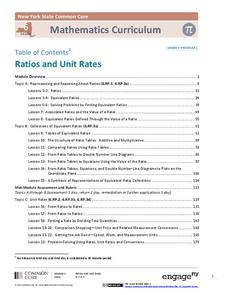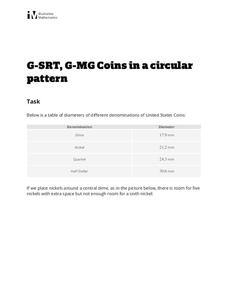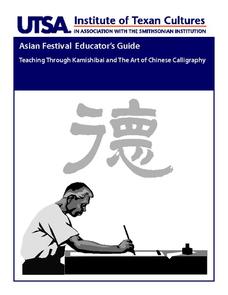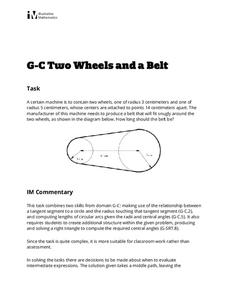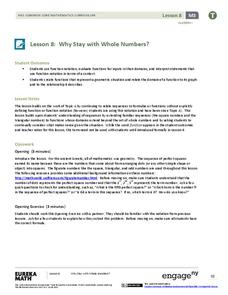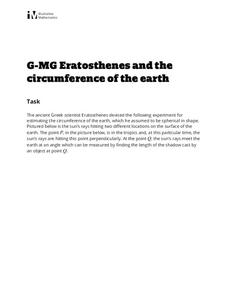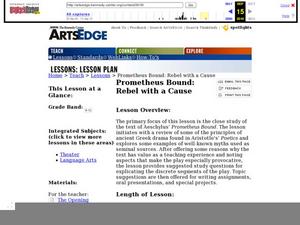EngageNY
Ratios and Unit Rates
This turn-key unit on ratios and unit rates walks through a 30-lesson unit on teaching proportional reasoning, with each lesson broken into detailed teaching notes and time allotments for all parts. An unbelievable resource when taken...
Council for the Curriculum, Examinations and Assessment
Morals, Values and Beliefs
Your personality is based on the things you believe in, the morals you abide by, and the values upon which you make your decisions. Delve into a set of lessons about values and moral framework with your eighth graders as...
Illustrative Mathematics
The Lighthouse Problem
Long considered the symbol of safe harbor and steadfast waiting, the lighthouse gets a mathematical treatment. The straightforward question of distance to the horizon is carefully presented, followed by a look into the...
Illustrative Mathematics
Coins in a Circular Pattern
What starts as a basic question of division and remainders quickly turns abstract in this question of related ratios and radii. The class works to surround a central coin with coins of the same and different values, then develops a...
Illustrative Mathematics
Accuracy of Carbon 14 Dating II
The scientific issue of carbon-14 dating and exponential decay gets a statistics-based treatment in this problem. The class starts with a basic investigation of carbon content, but then branches out to questions of accuracy and...
UTSA Institute of Texas Cultures
Teaching Through Kamishibai and The Art of Chinese Calligraphy
Young learners discover kamishibai, a popular Japanese storytelling art, and explore how these Japanese folktales illustrate the country's cultural themes and values through discussion and storyboarding.
EngageNY
Identifying Author’s Opinion and Evidence: The Value of Sports in People’s Lives, Part I
Just like instant replay, it's time to take a closer look! Pupils work together to add ideas to a Close Readers Do These Things anchor chart. They then put their knowledge to the test as they read an informational article about the...
EngageNY
Identifying Author’s Opinion and Evidence: The Value of Sports in People’s Lives, Part II
Context matters! Using the intuitive resource, pupils decipher context clues to determine the meaning of unknown words from an informational text. Also, in small groups, they practice identifying the author's opinion and supporting...
Council for Economic Education
Satisfaction Please! (Part 2)
Simply understanding consumer rights may not help people solve their problems. Understanding who to turn to becomes key in many different scenarios. Teach the value of various organizations that fight for consumer rights through...
School District of Palm Beach County
Egyptian Hieroglyphs
Humans have been developing number systems for thousands of years, and while they can be very different from one another, they can also share surprising similarities. Take your young mathematicians on a journey through the history...
Illustrative Mathematics
Seven Circles III
A basic set-up leads to a surprisingly complex analysis in this variation on the question of surrounding a central circle with a ring of touching circles. Useful for putting trigonometric functions in a physical context, as well as...
Illustrative Mathematics
Two Wheels and a Belt
Geometry gets an engineering treatment in an exercise involving a belt wrapped around two wheels of different dimensions. Along with the wheels, this belt problem connects concepts of right triangles, tangent lines, arc length, and...
EngageNY
Why Stay with Whole Numbers?
Domain can be a tricky topic, especially when you relate it to context, but here is a lesson that provides concrete examples of discrete situations and those that are continuous. It also addresses where the input values should begin and...
Illustrative Mathematics
Eratosthenes and the Circumference of the Earth
The class gets to practice being a mathematician in ancient Greece, performing geometric application problems in the way of Eratosthenes. After following the steps of the great mathematicians, they then compare the (surprisingly...
National Endowment for the Humanities
The New Order for "Greater East Asia"
Sometimes the New Order becomes synonymous with its implications for European countries, but what about its consequences for East Asia? The final instructional activity in a four-part series teaches scholars about World War II. High...
Scholastic
Pilgrim and Wampanoag Daily Life for Grades 6–8
Two slide shows, viewed side-by-side, permit middle schoolers to compare and contrast the lives of the Pilgrims of the Plimoth colony and the Wampanoags. Four videos take learners on virtual field trips to the Plymouth plantation. And an...
Nuffield Foundation
Investigating Enzymes Used in Laundry Detergent
It's a win-win situation: learn about enzymes and get clean clothes, too. Young scientists add enzymes to a dilution of laundry detergent. They apply them to stained fabrics to determine the effectiveness of the enzyme-filled detergents.
Curated OER
Prometheus Bound: Rebel with a Cause
If you are teaching Aeschylus' Prometheus Bound, you can't afford to miss this source. An extensive list of ideas outlines numerous discussion topics, writing prompts, comprehension questions, oral presentations, and projects. Have class...
EngageNY
Graphing the Logarithmic Function
Teach collaboration and communication skills in addition to graphing logarithmic functions. Scholars in different groups graph different logarithmic functions by hand using provided coordinate points. These graphs provide the basis for...
Curated OER
By Heart
To memorize, or not to memorize: that is the question. Whether 'tis nobler to suffer the fear and anguish of committing a poem to memory, to endure the heartache, to shuffle off this fear, and face the stares of classmates with the hue...
Central Oregon Community College
Things Fall Apart Study Guide
“There is no story that is not true.” And Chinua Achebe’s Things Fall Apart, uses proverbs (“. . .the palm-oil with which words are eaten”), a compelling tragic hero, and historic events, to engage readers in the truth of his story of...
Library of Congress
Determining Point of View: Paul Revere and the Boston Massacre
If you're teaching point of view, this is the lesson for you! First, decipher the writer's point of view from a primary resource, then compare and contrast the primary source with a secondary source to explore the Paul Revere's...
Teach Engineering
Designing a Sustainable Guest Village in the Saguaro National Park
Brainstorm ideas to design a sustainable guest village in the Sonoran Desert. The first installment of a nine-part unit teaches young environmental scientists about the basics of the Saguaro National Park and about sustainable design....
Habits of Mind
Haileybury Habits of Mind Learning Resource Book
Imagine a learning community committed to using Costa and Kallick's Habits of Mind as the basis of curriculum design. The resource book is packed with lessons that are designed for and identify the standards and...
